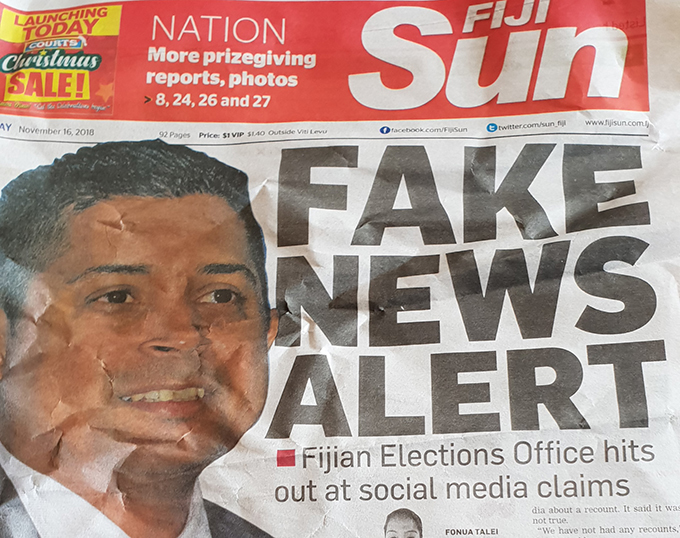
By Sri Krishnamurthi
“Fake News” was the catch phrase of the 2018 Fiji Elections – the second democratic elections since Commodore, now Prime Minister, Voreqe Bainimarama, carried out Fiji’s fourth coup in 2006.
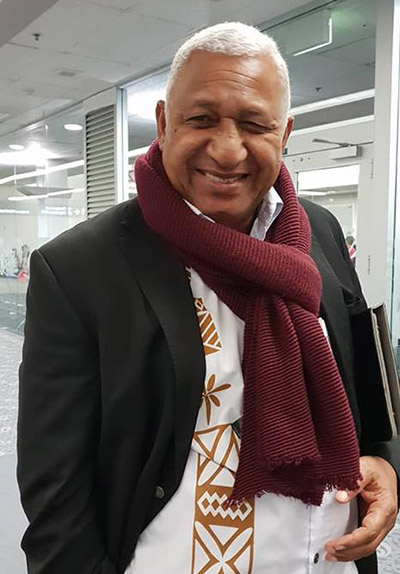
That FijiFirst with 227,241 (50.02 percent) votes won the elections with just over half of 458,532 votes cast, giving it 27 seats, is testimony to how nervous it was going into the elections.
The Social Democratic Liberal Party (SODELPA) won 181,072 votes (39.85 percent), close to 40 percent of the vote and gets 21 seats in parliament, doing better than it did in 2014, while the National Federation Party completes the makeup with 33,515 votes (7.38 percent) and three seats in the 51-seat Parliament.
“SODELPA – It’s strong indigenous propaganda supported by some deliberate misinformation contributed to a much improved performance, compared with 2014,” said the pro-government newspaper Fiji Sun today in its analysis of the elections.
This was a quaint way of accusing SODELPA of indulging in fake news by the government’s self-confessed propaganda organ.
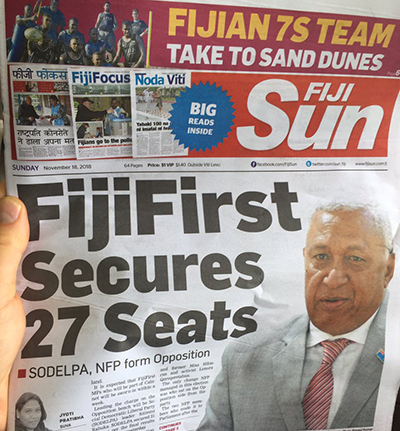
In his statement on winning the elections yesterday, published in the Fiji Sun, Bainimarama took the unusual step of accusing the other national daily newspaper, The Fiji Times, of colluding with the opposition in a thinly veiled attack on SODELPA.
“These same disruptive politicians of old, aided and abetted by The Fiji Times did not care to tell you the truth – the truth that iTaukei (Native) land is not only safe like never before under our Constitution but as total land holding has grown under FijiFirst,” he said in a statement.
‘Dishonest politicians’
“In fact it was only under the leadership of these same dishonest politicians that iTaukei land was actually and permanently alienated.
“Their lies and deception knew no boundaries, as individuals, whole communities and religious sentiments were slandered and belittled in an atmosphere of political deceit. They were willing to create economic chaos and undermine our economic future in their greed to win government,” Bainimarama said in his statement from New Zealand, where he was attending his brother Sevenaia’s funeral.
The 48-hour media blackout period – extended until Saturday, November 17, to allow for 22 polling venues to be opened for 7,458 people who were affected by floods – made it easy for social media trolls to make mischief.
At a press conference during the election, Ashwin Raj, the CEO of the Media Industry Development Authority (MIDA), admitted to being caught out by the ferocity of fake news and the social media.
In an interview with ABC’s Pacific Beat programme. Pacific Freedom Forum (PFF) co-chair Bernadette Carreon put her finger on the problem.
She said the vacuum left by the media blackout had led to fake news and misinformation being shared.
“The media is not allowed to publish any information regarding the election and so there have been reports of some fake websites coming up during the blackout and we call it fake news because it could potentially influence the voting,” she said.
Fact checking
“Media or the readers cannot fact check because the media is not allowed to air any news or information about the election process.”
That fake news dominated the media at the Fiji Elections Office (FEO) for more than two days was hardly surprising – as nothing could be reported on the campaign or the candidates.
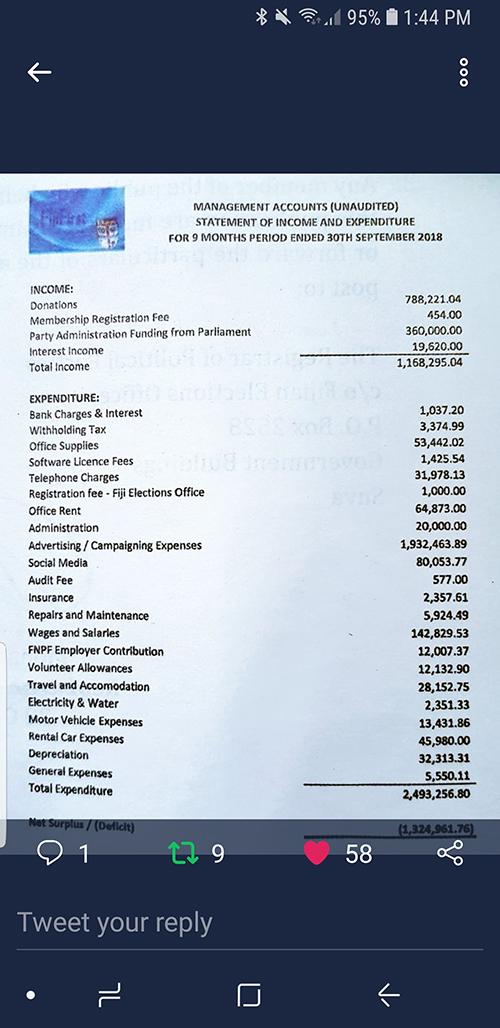
It has been reported on Twitter that FijiFirst, from the financial declarations last month, spent $1.9 million on advertising and $80,000 on social media as of 30 September 2018. (See image)
However, the media blackout and fake news did not have any influence on the Monday before the elections when SODELPA leader Sitiveni Rabuka faced the High Court for the appeal by the Fiji Independent Commission Against Corruption (FICAC) against charges of corruption which were initially dismissed.
The appeal was subsequently dismissed as well to loud cheers from his supporters.
The media scrum was a sight to behold as Rabuka emerged from courtroom victorious accompanied by his protégé Lynda Tabuya.
With more than 2000 people singing Fijian songs in harmony he was escorted down the steps of Parliament which backs onto the court house.
It appeared to be in defiance of the government which have for so long subdued the Fijian people and their natural exuberance.
Sigh of relief
It clearly signalled the portent of what was to come two days later in the elections, and one shudders to think of what could have happened that day had he lost the court case.
But, for now a collective sigh of relief in Fiji, relief that stability continues with murmurings of corruption, relief that a strong opposition is in place, and 10 women have made to Parliament making up 20 percent of the seats, but it bodes for uncertainty in the 2022 elections.
As Professor Jon Fraenkel from Victoria University of Wellington, a visitor and speaker at the University of the South Pacific, told the Australian Associated Press (AAP) on November 14.
“Many indigenous voters are wary of the endless polarisation and mind games of FijiFirst, and there is also considerable anti-Muslim sentiment targeted at the Attorney-General and his many appointees.”
A third term in government is difficult for any party and the warnings are already been written on the wall for FijiFirst – the people have spoken and will again.
Sri Krishnamurthi is a journalist and Postgraduate Diploma in Communication Studies student at Auckland University of Technology. He was attached to the University of the South Pacific’s Journalism Programme, filing for USP’s Wansolwara News and the AUT Pacific Media Centre’s Asia Pacific Report.
The courthouse media “scrum” when SODELPA leader Sitiveni Rabuka was cleared by the High Court last Monday to contest the 2018 Fiji general election two days later. Video: SK/PMC






























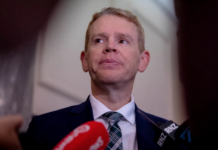
















Fiji has regressed in the last three decades. Politics of race and identity have divided the Pacific country more than ever thanks to the darkside of social media. After 2022 its anyones’s guess, Fiji future will be bleak as ever given the seed of racial hatred planted by father of Fiji coups-Mr Rabuka. Fiji’s armed forces are understandbly weary of his lingering and dangerous influence in Fiji political landscape. Australia and New Zealand need to seriously look at this dangerous man with fresh pair of eyes. The last thing Canberra, Wellington or even New Delhi want is a new genocidal ethnic civil war in the South Pacific.
Comments are closed.